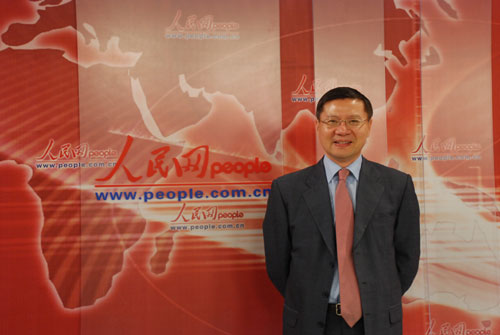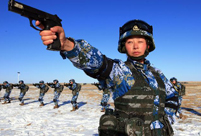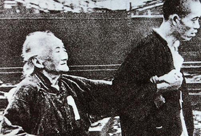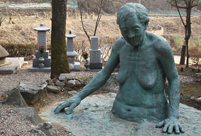 Chinese artists from Flight MH370 and their art
Chinese artists from Flight MH370 and their art
 Top 30 entrepreneurs under 30 in China
Top 30 entrepreneurs under 30 in China
 800-year-old ancient village in Shanxi
800-year-old ancient village in Shanxi
 World's top 10 most prestigious institutions
World's top 10 most prestigious institutions
 Chinese airborne troops conduct low altitude flight training
Chinese airborne troops conduct low altitude flight training
 Beautiful fisherwomen in SE China
Beautiful fisherwomen in SE China
 1,500-year-old coffin excavated from grassland in N China
1,500-year-old coffin excavated from grassland in N China
 See what Google glass captures at 'two sessions'
See what Google glass captures at 'two sessions'
 In pictures: beautiful women in different ages
In pictures: beautiful women in different ages
 |
| Zhang Weiwei (File Photo/ People’s Daily Online) |
Is China's extraordinary rise a model of economic reform without political reform? Is China's Achilles' heel its political system? Is China's one-party governance doomed in the face of mounting challenges from a more diversified economy and demanding society?
These are questions in many Western minds whenever China is mentioned. But the assumptions behind these questions may be misplaced, as one's understanding of China could be vastly different if a Chinese perspective were adopted. China's political governance, adapting itself constantly to new challenges through many minor reforms, has proven crucial for China's economic success. The following five aspects of China's political governance merit special attention:
First, one-party governance. In fact, there is nothing new about one-party governance in China: in most of the past two millennia since its first unification in 221 BC, China almost always practiced a kind of one-party rule, or rule by a unified Confucian ruling elite selected through public exams (the Keju), claiming to represent -- or genuinely representing -- most if not all under heaven. Furthermore, in most of the one-party-rule era, China was arguably a better governed country and a more prosperous economy than Europe of the same epoch. China only began to lag behind Europe when it closed its door to the outside world and missed the Industrial Revolution of the 18th century, but the country is now catching up fast.
The Communist Party of China has to a great extent followed this tradition and built an impressive system of selecting its leaders based on merit and performance. For instance, its top decision-makers (6 out of 7 Politburo's Standing Committee members) all worked at least twice as much as party secretaries or governors at the provincial level, which means they have on average administered a population of about 100 million before being promoted to their current positions in Beijing.
The CPC today, like its predecessors in China's long past, also claims to represent the whole nation, but with a mission to restore the country's premier world-class status. Key independent surveys, including those by the Pew or the Asian Barometer over the past decade, show a consistent pattern in which the Chinese central authorities command a high degree of respect and support (above 75 percent) within the country. Depicting China's polity as being on the verge of collapse, as appears so often in the Western media, is out of touch with China's reality.
In this context, the word "party" may be a misnomer for the CPC, as it bears no similarity with the type of political institutions like the Republican or Democratic parties of the U.S., which openly represent group interests of a society and compete with each other. The CPC has tried, in China's own political tradition, to represent the interests of the overwhelming majority of people, who apparently accept this, at least up to now, thanks largely to the fact that most people have found their living standards significantly improved over the past three decades.

 Chaihe village, pure and peaceful fairyland in snow
Chaihe village, pure and peaceful fairyland in snow Belgians warmly welcome arrival of China's giant pandas
Belgians warmly welcome arrival of China's giant pandas Female marines receive tactical training in NW China
Female marines receive tactical training in NW China Blood memory: Nanjing Massacre in 1937
Blood memory: Nanjing Massacre in 1937 Top 10 pure beauties in showbiz
Top 10 pure beauties in showbiz British WWII veteran: I can't forgive Japan
British WWII veteran: I can't forgive Japan Tongban's dream of prosperity
Tongban's dream of prosperity Chinese frigate Yancheng holds drills in Mediterranean Sea
Chinese frigate Yancheng holds drills in Mediterranean Sea A visit to comfort woman's home in South Korea
A visit to comfort woman's home in South Korea Fairyland? Qingdao in sea of clouds
Fairyland? Qingdao in sea of clouds Top 10 most handsome faces in Asia in 2013
Top 10 most handsome faces in Asia in 2013 Female celebs with beautiful long legs
Female celebs with beautiful long legs Cat 'guardians' in Forbidden City
Cat 'guardians' in Forbidden City Large numbers of ancient coins excavated in Inner Mongolia
Large numbers of ancient coins excavated in Inner Mongolia Leisurely life beneath Zhonggulou, where time travels slower
Leisurely life beneath Zhonggulou, where time travels slowerDay|Week|Month